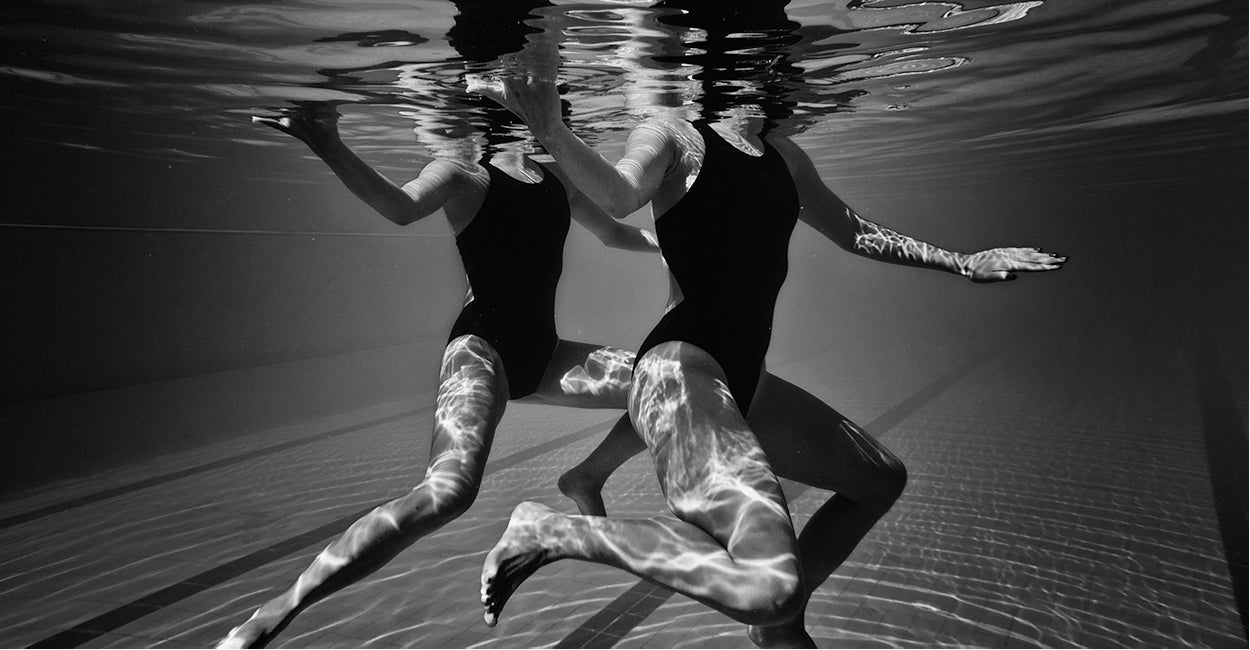In the 1960s, Sandra Bucha filed a lawsuit against the Illinois High School Association, seeking to be allowed to compete on the boys swim team because no girls teams existed in the state at the time.
The young athlete lost her suit, but went on to success as a marathon swimmer and eventual induction into the International Swimming Hall of Fame.
Bucha’s fight in the courtroom helped pave the way for passage of Title IX in federal law and equal opportunities for female athletes. Today, she is one of more than 300 female athletes who signed a letter to the National Collegiate Athletic Association asking it to defend the rights of women to compete on a level playing field.
The Daily Signal depends on the support of readers like you. Donate now
The veteran swimmer joins “Problematic Women” to share her story and explain why the transgender movement threatens to undo everything she and so many others fought for.
We also talk with Christine Rousselle, a reporter for EWTN and the Catholic News Agency, about why some states have allowed often-violent protests, but not funerals and church services. And of course, we crown our Problematic Woman of the Week.
Listen to the podcast below or read the lightly edited transcript.
Virginia Allen: Today, we are really excited to look at the transgender and women’s sports issue through the eyes of a woman who fought for women’s sports even before women had their own sports teams.
Sandra Bucha is a member of the International Swimming Hall of Fame and attorney and Title IX pioneer. Sandra, welcome to the show.
Sandra Bucha: Thank you very, very much. It’s a pleasure to be here.
Allen: Your story is honestly kind of the story that every little girl dreams of. You won nine different marathon swims in the 1970s. You set a number of records, and you pioneered the way for women to have their own sports teams. Just absolutely incredible.
So, let’s just start really simply: How did you get involved with swimming, and why was it such a passion of yours?
Bucha: Well, I can certainly credit all of my career to my parents. My mother and father always believed that allowing all of us—I’m the youngest of four children—to participate in extracurricular activities would basically keep us all out of trouble.
We had certain expectations to go to school and then to attend, whether it was swimming or piano lessons, whatever it might be, something other than just sitting idle at home.
I started with swimming around when I was seven or eight years old in St. Louis with a wonderful coach, who just nurtured me and taught me how to enjoy the sport. And then I happened to move to the state of Illinois, when I was around 10 after my father retired from the Army, and began swimming under the tutelage of coach Don Watson.
I happened to move to a premier swimming spot in the country when I was 10. He then saw something in me, nurtured and developed my swimming abilities, and I started at age 10 competing regularly in age-group swimming.
Lauren Evans: So, when you’ve reached high school, you were doing really well in your swimming career, and you didn’t want to stop. But the issue was that there were no girls swim teams in the state of Illinois.
So, you got permission to practice with the boys team, but you were not allowed to compete. Why was swimming so important to you that you were willing to be the only girl practicing with the boys?
Bucha: Well, by the time I graduated from middle school, our swimming coach, Don Watson, brought all of us girls. There were a number of girls on the age-group swim team, by the way. And back then, all the girls could do is train with age groupers.
That’s what they were known as. Different age-group categories: 10 and under, 11 and 12, 13 and 14, and then 15 and over. And these were age-group [Amateur Athletic Union] competitions.
By the time I got through eighth grade, I had been able to start qualifying for some of the more competitive competitions. Our swimming coach addressed the girls, and he said, “It’s not fair, but this is what I am going to do. If any of you girls can make the national AAU cutoff times, I will allow you to train with the boys team in high school.”
Unfortunately for the others, I was the only girl that made the national cutoff times. So, as a consequence, I was allowed to participate and train with the boys in high school.
The tragedy at this point was there were at least a dozen other girls, my age, that all found their swimming careers abruptly terminated because by the time they got to be freshmen in high school, there were no sports for girls at all, except perhaps badminton, I believe, at the time. And they had no other opportunity other than to continue with age-groupers, meaning young kids, to train and swim.
So, I was given an opportunity that no other girls in my high school were given, which was the opportunity to swim with the boys. When I was given that opportunity, obviously, I was privileged and humbled by the opportunity, and I pursued it as best as I could under coach Watson.
And as a consequence, he completely developed my swimming abilities.
Allen: So, then fast-forward to your senior year or right before your senior year of high school. You reached a point where the training was good, but you wanted to compete. So, you actually filed a lawsuit against the Illinois High School Association arguing that you should be able to swim alongside the boys.
Can you tell us a little bit about that fight and how it ended?
Bucha: Sure. Well, for four years, I was competing in national competitions throughout the state, just on age-group amateur teams, but I would be going to training every day before high school and then after school and train with the boys.
My father was actually a pioneer in this as well, because he is the one that saw that so many of my friends, including my co-plaintiff, Cynthia Sileo, were not given the same opportunity. And so we reached out to the ACLU at the time to ask them to represent girls.
The lawsuit said basically this: If a high school, publicly funded as it is, did not have a girls team in a non-contact sport, and there is a comparable boys team, then girls should be allowed to compete for a spot on that boys team with no special privileges of any kind.
The lawsuit was filed right around the time, and it preceded Title IX and basically said, again, there is no basis to not allow girls the same opportunity as boys in high school on behalf of the class of plaintiffs, which would be all of the female high school students that wanted to participate in sports and were denied that opportunity.
So, the lawsuit was filed for that purpose, and it was against the Illinois High School Association in the Northern District of Illinois.
Evans: I’m glad you brought up Title IX. It’s the legislation which created equal outcomes for women in sports. Can you tell us a little bit about that and what it actually does.
Bucha: Basically, Title IX was implemented in, I think, it was June or so of 1972—again, almost simultaneously when we had our lawsuit filed. Title IX basically was enacted to prevent discrimination against any sex or gender based only on sex or gender in participation of any high school activities, including in my case, it would be athletic activities. …
Women cannot be discriminated against, or girls can not be discriminated against; neither can boys. But it was mostly to redress the past wrongs that were done to girls by prohibiting them from participating in interscholastic sports.
The interesting thing is at the time that my lawsuit was filed, there were some interscholastic activities for girls, but they were regulated. They were regulated so much, in many archaic ways.
For example, you could have a girls intramural team, but you could not have organized cheering for that event. You could have a girls team, but you could not have awards that were valued more than a certain amount. I think it was a nominal amount of a dollar.
They had these just archaic rules that governed activities that girls were allowed to participate in. Title IX saw a mass discrimination against girls, mass discrimination against any educational facility that is receiving public funds. It basically said you may not discriminate against them. And Title IX ended up saying, eventually, that you may not [discriminate] against either sex on the basis of sex.
Evans: So, I can see why, women’s sports might not have the same enthusiasm behind them, and Title IX protects them. But why were there so many rules that really prohibited women’s sports? Like you mentioned, the nominal dollar amount for prizes.
Bucha: I have absolutely no idea. You often look at decades of evolution in sports education. It can be race equality. There are no bases for some of these.
I think there was a time similar to what happened at the turn of the century, with voting rights, with everything, where the laws were enacted arbitrarily without really any in-depth reasoning.
For example, with voting rights, women had to earn the rights to vote as did blacks had earned the right, not earn the rights, but receive the rights to vote.
Why were these rules and laws in place? I have no idea. But they were wrong, and no one was challenging them until efforts underway in the ’60s. You had the Civil Rights Acts in the ’60s. You had many young girls starting to file lawsuits, et cetera, as well.
So, there are no real reasons. I found no rational basis for any of these, except perhaps for whatever illogical reason there may be to do exactly what they did, which is discourage participation by girls in sports in high school.
Allen: Well, it’s amazing to see what Title IX has been able to accomplish for women. But right now, it feels like we’re almost moving a little bit backwards. We’re at this moment in history where women are losing championships, scholarship opportunities, and world record titles, to biological men who identify as women, as being transgender.
So, as someone who … fought to compete with the boys, and you were denied, what do you think about biological men being allowed to compete right alongside women?
Bucha: I have some very, very, very strong feelings about this. I have strong feelings about this because of what we experienced in the ’60s and ’70s.
In my lawsuit, the court actually found that men are by their nature taller than women, stronger than women, have greater muscle mass, have deeper breathing capacities. They literally found that there was a rational reason to allow separate but equal teams to be established in high school.
Now, mind you, Title IX said you must have separate but equal teams for boys and girls. When I was competing, again, there was no girls team. But I was told that I could not compete against a boys team for an equal spot by an equal manner to the best of my ability, strictly because I was a female, and the court found that there was a rational reason for that because boys biologically have an unfair advantage over girls.
I accepted that. Thankfully through Title IX and some similar lawsuits to ours, we eventually had girls sports in the state of Illinois.
Now, 50 years after that very law which was enacted to prohibit discrimination against women solely on the basis of sex, we now are discriminating again against women solely on the basis of sex.
What do I mean by that? I have no issue at all with respect to transgender rights, gay rights, all of that. When it comes to athletic competitions, however, you have transgender athletes who by their very nature are biological men, biological boys, and according to the experts hired and who have examined these studies over the years, have inherent physical abilities that are superior to those of a woman, a girl.
When you allow them to compete or force women to allow them to compete against them in a sport where they could easily be competing in a boys team instead, then you are once again discriminating against girls.
You are, by the very nature of their inherent biological abilities, discriminating against girls. I find that very, very troubling. I find, if you look at what the effect has, it literally is discriminating once again against girls.
Why do I say that? A transgender boy—meaning, someone who was a biological girl that now wants to become a boy—does not have an inherent biological advantage over boys. So, if you put that transgender boy into a competition, he or she will not be advantaged. But the converse is simply not true.
Evans: So, you’re not just talking about this, you’re doing something about it. You were one of 300-plus signers to a letter called “Save Women’s Sports,” which was sent to the National [Collegiate] Athletic Association Board of Governors. Can you let us know what was in that letter, and why did you decide to sign it?
Bucha: Basically, it is my understanding, ironically, that the ACLU now has also asked, yet they represented me back in 1972 and now it is almost as though they’ve taken a completely direct, opposite position to that, which they were pursuing back in 1972, is asking for the state of Idaho to be boycotted simply because it is not allowing men to compete against women in women’s sports.
And again, for the reasons I’ve already stated, that completely reverses the purpose and intent of Title IX and that for which I fought so strongly back in the ’70s.
Allen: Wow. That’s really wild that the ACLU, that they represented you. And now, you’re right, they’re on the exact opposite end essentially of this argument. Gosh, it’s amazing to see how quickly things change in such a short period of time.
And like you said, Idaho earlier this spring, or this past spring, they passed the Fairness in Women’s Sports Act that pretty simply just said, biological men cannot compete in women’s sports. And not even a month passed before the American Civil Liberties Union filed a lawsuit against them to try and get this law to be stricken down and really almost like erasing part of Title IX and these equal opportunities for women.
So, you are a lawyer. You have that background; you think in that way. Could you just speak a little bit from that legal perspective of how important you think this lawsuit is, long term, in setting precedent for other states who might be considering legislation to say, “Yes, we want to protect women’s sports from biological men.”
Bucha: Well, I think what you have to look at is the purpose behind Title IX back in 1972. The purpose was to redress past discrimination against girls, against women. And now what they are doing is not only eliminating all the progress that was made there, they are now regressing and almost ignoring what the case precedents [were].
If you take a look at what the Equal Protection Clause of the 14th Amendment requires, it is equal protection under the laws as they apply to men and women. Now, the issues with respect to allowing boys to compete against girls on girls team or vice versa was all resolved back in the ’70s. At least that’s what we thought.
And when we filed our lawsuit, the lawsuit said if a girl’s team does not exist, then girls should be allowed to compete against boys on an equal basis. By the same token, if there is not a comparable boys team, the boys could be allowed to compete against girls. That would be the fair interpretation.
My understanding of what Idaho does is, it doesn’t matter whether you have girls teams and boys teams that are already in existence, they can willy-nilly decide to compete with each other against each team to get on the same team.
And they ignore the inherent physical differences between the two sexes. It is unfortunate, because it’s going to impact girls once again much more broadly than it will ever impact boys.
My heart bleeds for some of these girls that I have seen. I’ve seen them interviewed. I’ve seen how they have worked all of their lives for the past 10 years, for example, with one competition in mind. It’s a national competition for which they had qualified. And then now, because of a couple of transgendered athletes that came in within the last number of months, they were displaced, and they are no longer allowed to go to that national competition.
That is a direct discrimination against those girls, who otherwise would have made the team, then allowed to meet their dreams and be allowed to compete at the national level. That is inherent discrimination. And once again, it is reversing back to a time where only girls are being discriminated against. It’s not the boys, it’s the girls that are being discriminated against.
Evans: We can talk about this all day. It’s such an important issue, but Sandra, thank you for standing up for women back in the ’70s and thank you for standing up for women today.






























